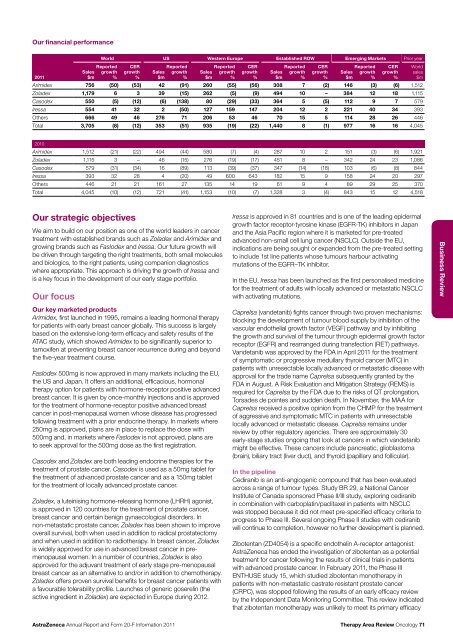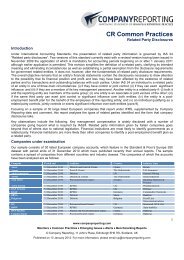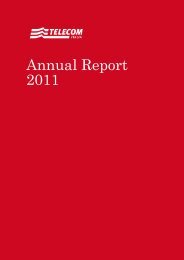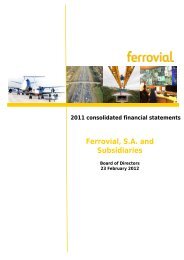AstraZeneca Annual Report and Form 20-F Information 2011
AstraZeneca Annual Report and Form 20-F Information 2011
AstraZeneca Annual Report and Form 20-F Information 2011
- No tags were found...
You also want an ePaper? Increase the reach of your titles
YUMPU automatically turns print PDFs into web optimized ePapers that Google loves.
Our financial performanceWorld US Western Europe Established ROW Emerging Markets Prior year<strong>Report</strong>ed CER<strong>Report</strong>ed<strong>Report</strong>ed CER<strong>Report</strong>ed CER<strong>Report</strong>ed CER World<strong>20</strong>11Sales$mgrowth%growth%Sales$mgrowth%Sales$mgrowth%growth%Sales$mgrowth%growth%Sales$mgrowth%growth%sales$mArimidex 756 (50) (53) 42 (91) 260 (55) (56) 308 7 (2) 146 (3) (6) 1,512Zoladex 1,179 6 3 39 (15) 262 (5) (9) 494 10 – 384 12 18 1,115Casodex 550 (5) (12) (6) (138) 80 (29) (33) 364 5 (5) 112 9 7 579Iressa 554 41 32 2 (50) 127 159 147 <strong>20</strong>4 12 2 221 40 34 393Others 666 49 46 276 71 <strong>20</strong>6 53 46 70 15 5 114 28 26 446Total 3,705 (8) (12) 353 (51) 935 (19) (22) 1,440 8 (1) 977 16 16 4,045<strong>20</strong>10Arimidex 1,512 (21) (22) 494 (44) 580 (7) (4) 287 10 2 151 (3) (6) 1,921Zoladex 1,115 3 – 46 (15) 276 (19) (17) 451 8 – 342 24 23 1,086Casodex 579 (31) (34) 16 (89) 113 (39) (37) 347 (14) (18) 103 (6) (8) 844Iressa 393 32 28 4 (<strong>20</strong>) 49 600 643 182 15 9 158 24 <strong>20</strong> 297Others 446 21 21 161 27 135 14 19 61 9 4 89 29 25 370Total 4,045 (10) (12) 721 (41) 1,153 (10) (7) 1,328 3 (4) 843 15 12 4,518Our strategic objectivesWe aim to build on our position as one of the world leaders in cancertreatment with established br<strong>and</strong>s such as Zoladex <strong>and</strong> Arimidex <strong>and</strong>growing br<strong>and</strong>s such as Faslodex <strong>and</strong> Iressa. Our future growth willbe driven through targeting the right treatments, both small molecules<strong>and</strong> biologics, to the right patients, using companion diagnosticswhere appropriate. This approach is driving the growth of Iressa <strong>and</strong>is a key focus in the development of our early stage portfolio.Our focusOur key marketed productsArimidex, first launched in 1995, remains a leading hormonal therapyfor patients with early breast cancer globally. This success is largelybased on the extensive long-term efficacy <strong>and</strong> safety results of theATAC study, which showed Arimidex to be significantly superior totamoxifen at preventing breast cancer recurrence during <strong>and</strong> beyondthe five-year treatment course.Faslodex 500mg is now approved in many markets including the EU,the US <strong>and</strong> Japan. It offers an additional, efficacious, hormonaltherapy option for patients with hormone-receptor positive advancedbreast cancer. It is given by once-monthly injections <strong>and</strong> is approvedfor the treatment of hormone-receptor positive advanced breastcancer in post-menopausal women whose disease has progressedfollowing treatment with a prior endocrine therapy. In markets where250mg is approved, plans are in place to replace the dose with500mg <strong>and</strong>, in markets where Faslodex is not approved, plans areto seek approval for the 500mg dose as the first registration.Casodex <strong>and</strong> Zoladex are both leading endocrine therapies for thetreatment of prostate cancer. Casodex is used as a 50mg tablet forthe treatment of advanced prostate cancer <strong>and</strong> as a 150mg tabletfor the treatment of locally advanced prostate cancer.Zoladex, a luteinising hormone-releasing hormone (LHRH) agonist,is approved in 1<strong>20</strong> countries for the treatment of prostate cancer,breast cancer <strong>and</strong> certain benign gynaecological disorders. Innon-metastatic prostate cancer, Zoladex has been shown to improveoverall survival, both when used in addition to radical prostatectomy<strong>and</strong> when used in addition to radiotherapy. In breast cancer, Zoladexis widely approved for use in advanced breast cancer in premenopausalwomen. In a number of countries, Zoladex is alsoapproved for the adjuvant treatment of early stage pre-menopausalbreast cancer as an alternative to <strong>and</strong>/or in addition to chemotherapy.Zoladex offers proven survival benefits for breast cancer patients witha favourable tolerability profile. Launches of generic goserelin (theactive ingredient in Zoladex) are expected in Europe during <strong>20</strong>12.Iressa is approved in 81 countries <strong>and</strong> is one of the leading epidermalgrowth factor receptor-tyrosine kinase (EGFR-TK) inhibitors in Japan<strong>and</strong> the Asia Pacific region where it is marketed for pre-treatedadvanced non-small cell lung cancer (NSCLC). Outside the EU,indications are being sought or exp<strong>and</strong>ed from the pre-treated settingto include 1st line patients whose tumours harbour activatingmutations of the EGFR–TK inhibitor.In the EU, Iressa has been launched as the first personalised medicinefor the treatment of adults with locally advanced or metastatic NSCLCwith activating mutations.Caprelsa (v<strong>and</strong>etanib) fights cancer through two proven mechanisms:blocking the development of tumour blood supply by inhibition of thevascular endothelial growth factor (VEGF) pathway <strong>and</strong> by inhibitingthe growth <strong>and</strong> survival of the tumour through epidermal growth factorreceptor (EGFR) <strong>and</strong> rearranged during transfection (RET) pathways.V<strong>and</strong>etanib was approved by the FDA in April <strong>20</strong>11 for the treatmentof symptomatic or progressive medullary thyroid cancer (MTC) inpatients with unresectable locally advanced or metastatic disease withapproval for the trade name Caprelsa subsequently granted by theFDA in August. A Risk Evaluation <strong>and</strong> Mitigation Strategy (REMS) isrequired for Caprelsa by the FDA due to the risks of QT prolongation,Torsades de pointes <strong>and</strong> sudden death. In November, the MAA forCaprelsa received a positive opinion from the CHMP for the treatmentof aggressive <strong>and</strong> symptomatic MTC in patients with unresectablelocally advanced or metastatic disease. Caprelsa remains underreview by other regulatory agencies. There are approximately 30early-stage studies ongoing that look at cancers in which v<strong>and</strong>etanibmight be effective. These cancers include pancreatic, glioblastoma(brain), biliary tract (liver duct), <strong>and</strong> thyroid (papillary <strong>and</strong> follicular).In the pipelineCediranib is an anti-angiogenic compound that has been evaluatedacross a range of tumour types. Study BR 29, a National CancerInstitute of Canada sponsored Phase II/III study, exploring cediranibin combination with carboplatin/paclitaxel in patients with NSCLCwas stopped because it did not meet pre-specified efficacy criteria toprogress to Phase III. Several ongoing Phase II studies with cediranibwill continue to completion, however no further development is planned.Zibotentan (ZD4054) is a specific endothelin A-receptor antagonist.<strong>AstraZeneca</strong> has ended the investigation of zibotentan as a potentialtreatment for cancer following the results of clinical trials in patientswith advanced prostate cancer. In February <strong>20</strong>11, the Phase IIIENTHUSE study 15, which studied zibotentan monotherapy inpatients with non-metastatic castrate resistant prostate cancer(CRPC), was stopped following the results of an early efficacy reviewby the Independent Data Monitoring Committee. This review indicatedthat zibotentan monotherapy was unlikely to meet its primary efficacyBusiness Review<strong>AstraZeneca</strong> <strong>Annual</strong> <strong>Report</strong> <strong>and</strong> <strong>Form</strong> <strong>20</strong>-F <strong>Information</strong> <strong>20</strong>11Therapy Area Review Oncology 71










